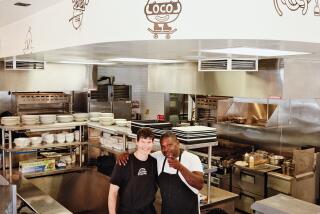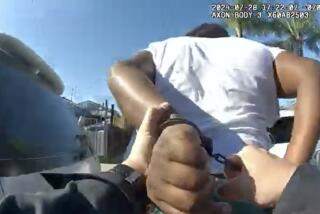Partners Make Watts Market a Meaty Venture
Baron Jones and Basil Clark normally supervise the cutting of multimillion-dollar business deals. These days they’re supervising the cutting of ham hocks.
Jones, a 38-year-old commercial real estate broker, and Clark, his 30-year-old lawyer, recently purchased a rickety but lucrative meat and poultry store on Central Avenue in Watts, a world away from the glamorous, fast-track careers they had carved for themselves.
Despite the incongruities, the story of how Jones and Clark purchased Turner’s Market, one of Watts’ institutions, is the story of how two generations and two styles of business melded happily.
It begins with the man who sold the market: George Turner, 74. Clad in a paint-splattered blue work suit, a yellow baseball cap and scruffy shoes, Turner looks more like a hired handyman than a well-heeled businessman. But then, Turner has never worried about appearances. He’s been too busy working seven days a week every week since 1953, when he opened his market and began selling the soul-food products he was raised on in a Louisiana town called Plain Dealing.
Waiting for Customers
“My wife was mad at me,” Turner remembered, “because I gave up a $3-an-hour job--and that was good money--to sit on a soda water box outside the storefront waiting for customers. Watts was practically dirt streets then.”
It was a life of waking up in the middle of the night, coming into the store at 3 a.m., closing the doors and slaughtering enough chickens to fill the display cases that day. But Turner profited, expanded his little store and bought up the land around it.
He didn’t worry much about painting, or clearing out the rubbish or keeping the store immaculate, or covering up the odors of the hundreds of live chickens on the premises. He didn’t have to. Business was growing, and even those customers who moved away from Watts kept driving back from places such as Ladera Heights and Pomona and Pasadena for everything from hot-link sausages to Creole mustard to black-eyed peas.
The little market, with only 10 employees, was doing between $1 million and $2 million a year in sales in recent years, and Turner began to make plans to sell and retire. He and his wife bought a ranch in Palmdale. But as he thought about finding a buyer, he started to worry that someone might simply bulldoze the place, or drastically change it.
Business Associate
He told these concerns to Basil Clark, the young lawyer he had retained at the suggestion of his insurance broker, Ann Timas, who was a friend of Clark. Clark, who was raised in the South Bronx but came to Los Angeles to attend law school, had another client and business associate, Baron Jones, who had established himself as a highly successful real estate broker with a Los Angeles company before setting up his own business.
One day this year Clark was talking to Jones about the Turner market, describing its profitability and potential.
“Who can we sell it to?” Clark asked.
“You can sell it to us,” Jones said.
No matter that neither Jones nor Clark had any experience in the less-rarefied air of the food business. There was a higher principle here. Jones, who attended Dorsey High School in Southwest Los Angeles and then won scholarships to Princeton University and the University of Pennsylvania’s Wharton School of Business, remembered a favored professor’s advice: It doesn’t matter what the business is as long as you understand the flow of cash receipts. There were good receipts here.
“This is a little gold mine,” Clark said. “I work with a lot of black businesses and I know there’s a lot of money being made on this side of town.”
Preserve Aesthetics
Turner said he decided to sell to Clark and Jones, at a price neither side would disclose, after they made it clear that they would preserve the country-store aesthetics, even as they spruced up the place.
“It’s a colored market and I tried to put colored back in,” Turner said.
Mayor Tom Bradley would never put it that way, but he appreciated the symbolism enough to drop in on the new owners last month during a daylong tour of Watts.
“These guys are going to be looked up to by a lot of young people,” said Tavis Smiley, a Bradley administrative assistant who works in South Los Angeles.
“Nowadays when you see entrepreneurs generally they’re shooting for things like real estate, looking to get property in nice areas. It’s not too often you see young entrepreneurs looking to buy something in the heart of Watts.”
Making a Contribution
Jones and Clark, who both live in Santa Monica, said they are pleased to make a contribution to the inner-city. Jones has already given a considerable amount. When he was barely into his 30s he contributed $100,000 to a California foundation to provide scholarships for minority business students. He said his own academic success was due to a persistent mother.
“All I can remember was my mother and the ruler,” Jones said, smiling. “If I didn’t spell the word right she’d knock me with it. Eventually you get it right.”
Primarily, however, both men said they invested in Watts because of business instincts. Both believe that once the market is painted and the grounds are cleaned of years of accumulated debris they will be able to attract more business from middle-class blacks who, while familiar with Turner’s, have moved to suburban communities and are hesitant to come to Watts.
Professional Language
The partners speak the language of their professions, using words such as “clients,” “market share” and “strategy” to sculpt the store’s future, including its desire to cater to a growing Latino population. In the eight weeks since they bought the market they have spent much of their time there, putting their investment and legal chores on hold, trying to learn at the foot of Turner, who despite his retirement will still be spending considerable time there.
After all, Turner said amiably, “They got the books but I’m learning them the actual thing. If you ain’t got some of that experience, that know-how, you’re pretty well sunk.”
More to Read
Inside the business of entertainment
The Wide Shot brings you news, analysis and insights on everything from streaming wars to production — and what it all means for the future.
You may occasionally receive promotional content from the Los Angeles Times.









